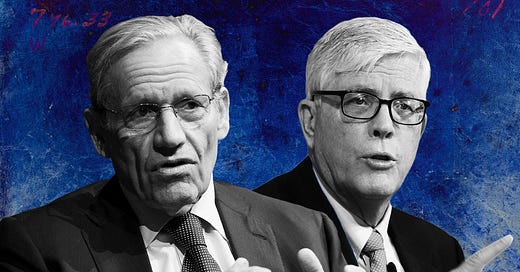Hugh Hewitt vs. Bob Woodward and the Washington Post
Diversity is not a suicide pact.
1. Media Diversity
Over the weekend, my colleague Amanda Carpenter stumbled onto a hit from the archives in which I learned that Hugh Hewitt once did a stint as Guardian of the Nixon Flame, serving as executive director of the Richard Nixon Library and Birthplace.
Am I surprised that Hewitt was such a partisan that he’d take this disreputable job? Obviously not. Hewitt is a guy who will suit up for Team Red no matter what it requires: Defending pro-choice RINO squish Harriet Miers? He’s on it. Prosecuting the GWOT to the fullest? Absolutely. Going two fists in on Donald Trump’s anti-free-market isolationism? No problem. Slap an elephant sticker on it and Hewitt will defend it.
No. What caught my attention was this little aside in the story about Hewitt stepping down from the Nixon gig in 1990:
Hewitt stirred national controversy when he told The Times a week before the library’s opening that researchers would be screened and those seen as anti-Nixon would be denied access to the former President’s papers and records.
Hewitt singled out Washington Post reporter Bob Woodward, who won a Pulitzer Prize with colleague Carl Bernstein for coverage of the Watergate scandal that led to Nixon’s resignation in 1974, as one potential researcher who would be denied access to the facility. “He’s not a responsible journalist,” Hewitt said at the time.
So Hugh Hewitt declared that Bob Woodward, the most important Washington Post reporter in the history of the paper, was “not a responsible journalist.”
Not that Hewitt thought Woodward was a jerk.
Or that he had specific complaints about Woodward’s conduct in Instances A, B, and C.
But that, at a fundamental level, Hewitt’s judgment was that Woodward was not a “responsible” practitioner of the profession.
And the Washington Post’s response to this was to . . . give Hewitt real estate on their op-ed page.
An institution like a newspaper need not endorse every view of every person who contributes to it. For example, the paper should not be on the hook for the entire Twitter history of every person who writes a one-off essay.
But in general, the institution has a duty to carry out some basic gatekeeping functions. For instance, that it will not present viewpoints which are wildly irresponsible.1
Another basic gatekeeping function ought to be: The institution will not give its platform to voices whose most fundamental judgments it views to be egregiously wrong.
So: Hugh Hewitt says that Bob Woodward is “not a responsible journalist.” Presumably, that means that Hewitt does not—or did not—believe that the Post should have been publishing Woodward’s work.
The Post believed then and believes now that Woodward is a responsible journalist. That Woodward’s work conforms to the standards of the profession and adds to the public discourse.
When it comes to fundamental disagreements about the soundness of someone’s judgment, it doesn’t get much bigger.
If Hewitt’s view of Woodward was the least bit defensible, then the Post shouldn’t be publishing Woodward’s reporting.
If Hewitt’s view of Woodward is not at all defensible, then how could the Post trust his judgment on anything?2
How could it, in good conscience, present such to readers as just one more viewpoint to consider? We believe you should trust Bob Woodward’s professional integrity! But maybe you don’t! Everyone’s entitled to their opinion!
And so there Hewitt is, on the Post’s op-ed page, chugging along with his column once a week since 2017. The Post smiling and grinning while serving him up to readers as just another exercise in ideological diversity.
To be clear: This isn’t a Hugh Hewitt problem. God bless him—he is what he is. You might as well get mad at water for being wet.
No, this is a Washington Post problem. And maybe even a liberalism problem.
Do you ever get the sense that diversity has turned into a suicide pact?





